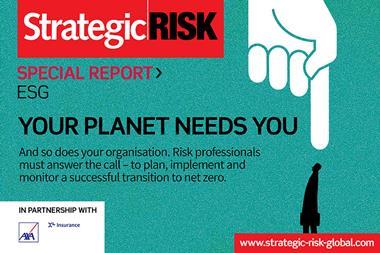75% of European risk professionals believe their role in ESG initiatives and strategy should be active or more active
Over half half of risk managers are significantly involved in their organisation’s ESG efforts, but 77% believe they should take an active or more active role in ESG strategy and initiatives, according to a survey by WTW.
WTW surveyed 312 corporate risk managers world-wide. One third said ESG currently influences risk management strategy, and an additional 9% said it is set to do so during the next two years.
However, only 35% of North American risk managers – and fewer in other regions – expect to have documented ESG risk management targets and milestones within two years.
Nonetheless, ESG is high on corporate agendas, with 74% of respondents stating that an improved ESG score is a core focus for their business. Regional differences are large, with ESG priorities highest in the Asia Pacific region, with the survey indicating this is lower among North American companies.
Overall, 24% of US companies have set ESG risk management targets with clear milestones.
| Where ESG figures in current regional business priorities, by region | APAC | EMEA | LATAM | North America |
|---|---|---|---|---|
|
“Risk management should take a (more) active role in ESG initiatives and strategy” |
95% |
75% |
89% |
66% |
|
“Improving our ESG score is a core focus for the business” |
90% |
83% |
75% |
57% |
|
“Our organisation has clear and specific ESG goals” |
70% |
68% |
76% |
58% |
|
Source: WTW 2022 ESG Global Risk Managers Survey |
||||
Most respondents believe that management of environmental liability risks influences ESG standing, and three quarters have taken actions to address environmental liability and climate risks (four fifths in APAC). However, many have done so without adopting specific goals or key performance indicators.
Risk management and governance intersect most frequently in due diligence linked to risk advisor, broker, and insurance-carrier appointments and reviews.
Two thirds of risk manager respondents say they are extensively involved in these areas, compared with around 40% that carry out similar work related to suppliers and investment opportunities.
Risk managers identified key social-risk-management priorities as data privacy and cyber risk (97%), workplace safety (88%), product liability (79%), and employment practice liability (78%).
Lisa Lipuma, director of Enterprise Risk Consulting, North America, WTW, said: “Many organisations equate ESG risk with reputational risk, but to manage ESG effectively it must be broken down into measured, manageable risks, and a risk management process established around them.
”Companies should first take a ground-up look at what ESG is, then identify the specific risks they face through a risk-mapping exercise. Finally, they should assess the impact, likelihood, and velocity of each risk before bringing them into the enterprise risk management framework.”




















No comments yet